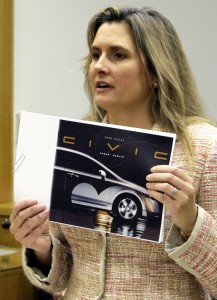
Los Angeles Superior Court Commissioner Douglas Carnahan ruled Wednesday that the automaker misled Heather Peters about the potential fuel economy of her hybrid car and awarded her $9,867 – much more than the couple hundred dollars cash that a proposed class-action settlement is offering.
“At a bare minimum Honda was aware … that by the time Peters bought her car there were problems with its living up to its advertised mileage,” Carnahan wrote in the judgment.
Honda disagrees with the judgment rendered in the case and plans to appeal the decision, company spokesman Chris Martin said in a statement.
Peters, a former lawyer, said she is renewing her legal license after a 10-year lapse so she can represent other Honda owners who have the same problems she did.
“Wow! Fantastic. I am absolutely thrilled,” she said when The Associated Press informed her of the judge’s decision. “Sometimes big justice comes in small packages. This is a victory for Honda Civic owners everywhere.”
Carnahan included in his 26-page decision a long list of misleading representations by Honda that he said Peters had correctly identified. Among them were that the car would use “amazingly little fuel,” “provides plenty of horsepower while still sipping fuel,” and that it would “save plenty of money on fuel with up to 50 mpg during city driving.”
“Actual performance of plaintiff’s vehicle did not live up to these standards,” he said. He noted that when she began receiving much less than the advertised mileage, “she knew she had a problem.”
Peters opted out of the class-action lawsuit so she could try to claim a larger damage award for her 2006 Honda Civic’s failure to deliver the 50 mpg that was promised.
The proposed class-action settlement would give aggrieved owners $100 to $200 each and a $1,000 credit toward the purchase of a new car. Legal fees in the class action would give trial lawyers $8.5 million, Peters said.
In small claims court, there are no attorneys’ fees and cases are decided quickly.
Peters had hoped to inspire a flood of small-claims lawsuits by the other 200,000 people whose Honda Civic hybrids are covered by the proposed settlement. If all 200,000 owners sued and won in small claims court, she said, it could cost Honda Motor Co. $2 billion.
Peters launched a website, DontSettleWithHonda.org, and said she was contacted by hundreds of other car owners seeking guidance on filing small claims lawsuits if they opted out of the class-action case. But legal experts say it’s unlikely that many owners would take the small-claims route because of the time and energy involved in pursuing such lawsuits.
Carnahan found that Honda did commit fraud, but he could not find intentional fraud and thus did not award punitive damages. Most of the damages Peters was awarded were for extra money spent on fuel, both in the past and future, the cost of the car battery, and the decrease in the car’s value because of its problems.
A judge in San Diego County is due to rule in March on whether to approve Honda’s class-action settlement. Members of the class have until Feb. 11 to accept or decline the deal.
Was this article valuable?
Here are more articles you may enjoy.


 US Supreme Court Rejects Trump’s Global Tariffs
US Supreme Court Rejects Trump’s Global Tariffs  Viewpoint: Runoff Specialists Have Evolved Into Key Strategic Partners for Insurers
Viewpoint: Runoff Specialists Have Evolved Into Key Strategic Partners for Insurers  Insurance Broker Stocks Sink as AI App Sparks Disruption Fears
Insurance Broker Stocks Sink as AI App Sparks Disruption Fears  Fla. Commissioner Offers Major Changes to Citizens’ Commercial Clearinghouse Plan
Fla. Commissioner Offers Major Changes to Citizens’ Commercial Clearinghouse Plan 

